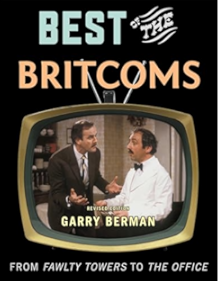“Best of the Britcoms” at 25

If I may be permitted this shameless act of self-indulgence…
September 1 will mark the 25th anniversary of the publication of my first book, Best of the Britcoms - From Fawlty Towers to Absolutely Fabulous, celebrating the finest of British situation comedies roughly between 1975 and 1995.
The publication of the book launched my career as a professional writer, allowing me to soar to the very heights of obscurity. Ten years later, in response to the impassioned pleas of absolutely no one, I published an updated and expanded edition of the book, Best of the Britcoms, From Fawlty Towers to The Office, offering seven additional chapters. Each edition appeared on bookstore shelves much to the delight of at least dozens of Britcom fans scattered among the major land masses of the Earth.
The book was a natural result of my love of British television comedy. I wrote it when the Internet was still a young entity, faxes had proven to be faster than “snail mail,” and access to the Britcoms I enjoyed was quite limited to various PBS stations and cable networks. With the later emergence of YouTube, Brit Box, and other outlets, fans have been able enjoy current and older British comedy far more easily (which is a good thing, especially since Britcoms have virtually disappeared from PBS in America, due to a combination of factors).
Here’s how the book came to be…
A smattering of British sitcoms found their way to American outlets with barely a notice in the early 1970s (Doctor in the House, Father Dear Father). The inimitable Benny Hill’s sketch show made a much bigger splash. As a lifelong Anglophile and Monty Python fanatic since that program’s American debut in 1974, I began to find other British comedy programs — sitcoms — on local PBS stations in the New York area in the early 1980s. There were three stations airing the shows: WLIW on Long Island, which aired a 3-hour block of Britcoms every Friday night, the UHF channel WNYC, and New Jersey’s WNJN. All had slightly different selections, which, lucky for me, enhanced my menu of choices.
But Friday evenings with WLIW became the routine that proved the most satisfying. Funny, creative, well-written sitcoms from the ’70s and ’80s for an entire evening each week! At some point, I began to fear that most or all them might suddenly disappear from the station schedules without warning, leaving me with nothing to remember them by. So, I began to videotape the Friday night line-up, which changed over time with the addition of newly imported series replacing the older or short-lived sitcoms, eventually accumulating a library of hundreds of hours of Britcoms on VHS tapes.
In 1995, over a late-night burger at my favorite diner, the thought occurred to me that I might be able to do something constructive with the tapes, boxes of which had been encroaching on my living space. I suspected that there had to be untold numbers of Britcom fans like me who enjoyed the shows, but had little opportunity to learn much about them. There was precious little written about them in magazines and newspapers. This thought in turn led to another: Why not write a book, using the Britcoms I had on tape as the foundation material, and then try to contact those who could tell me about their creation and production?
I don’t remember how I found the central phone number for the BBC, but I managed to briefly speak with Jenny Secombe, head of the BBC Publicity Department for Light Entertainment-Comedy (and daughter of legendary comedian Harry Secombe, of The Goon Show radio show fame). I then sent her a fax explaining in detail what kind of book I’d like to write.

To my amazement, she replied quickly, giving me the names of people who could help me on a day-to-day basis. I was thrilled.

Before I knew it, I was asking for and receiving phone/fax numbers of the actors, directors, producers, and writers of the comedies, as well as the names of their agents, who arranged the phone interviews I was to conduct — twenty in all, by the time I was done.
I don’t know how I was able to speak with those comedy heroes of mine (Gorden Kaye of ‘Allo, ‘Allo, Peter Bowles of To the Manor Born, Julia St. John of The Brittas Empire) without getting star-struck or tongue-tied, but I think I managed not to embarrass myself, or them. They were not household names in the U.S., but I was, as they might say, gobsmacked to speak with them and ask them about their respective series I had been enjoying so much.
In addition to the actors, interviewing the creator/writers and producers like David Croft (Are You Being Served?, ‘Allo, ‘Allo’) John Lloyd (The Black Adder) and David Renwick (One Foot in the Grave) was especially enjoyable and eye-opening. I still have the cassette tapes of the interviews — as well as every e-mail and fax I printed out, and every other piece of material and communication that took place during the process. The late, great comic actor Richard Briers, who starred in the ’70s series The Good Life (re-named Good Neighbors for U.S. distribution) and other sitcoms, spoke with me at length and agreed to write the foreword.

Here I was, a nobody with no track record as a writer or journalist, receiving all of this cooperation. A wonderful girl in the BBC Press & Publicity Office named Eva de Romarate patiently attended to my endless requests for materials, program episode synopses, photos, and more.

After a long and often aggravating search for a literary agent, I found Nicholas Smith of the Altair Literary Agenc in New York, who guided me as we came up with a strategy to help interest potential publishers. We agreed that I needed to demonstrate that the book would have a substantial American readership. One brainstorm I had was to find the PBS stations across the country that, like WLIW, also offered weekly programming blocks of Britcoms, tell them the book idea, and ask if they might consider using the book — once it’s published — as a thank-you gift for contributions during their periodic on-air pledge drives. I received many letters from station managers across the country expressing their enthusiasm (including from none other than WLIW).

Nicholas found a publisher, Taylor Books (a division of Rowman & Littlefield), and I was assigned an editor and a publicist.
Finally, on August 30, 1999, I received an e-mail from the publicist announcing, “We’ve got books today!” (with September 1 to be listed as the official publication date).
I was a published author. Interviews, feature articles and reviews followed, as did a little a book publishing party with my friends; the review I cherish the most appeared in Entertainment Weekly magazine (both the print and online versions):

And the PBS stations kept their word during their pledge drives.

It was a long, tricky road to get from a spark of an idea to the finished product, and I’m still not entirely sure how I did it, but my main goal had been achieved — to celebrate British sitcoms and use my writing skills, such as they are, to offer my fellow American fans a source of information about the programs they had been enjoying as much as I did.
Ten years later, when I felt a need to update the book and add new chapters for programs that had made their way across to America since the first edition was published, I found that some things had changed, and not all for the better. I added seven chapters (including one each for The Office and Extras, which gave me the opportunity to interview writer/actor Stephen Merchant, even as he was suffering from a bad cold), but found myself with a smaller budget for licensing photos, and that the BBC fees for this had become prohibitively expensive. So, there were more chapters and fresher information, but way fewer photos, which hurts a book about television. Still, I’m glad I was able to keep pace with the world of British sitcoms to that point.

And, yes, still more hilarious Britcoms, such as Outnumbered, The IT Crowd, and Miranda made the journey from the U.K. to our screens since the revised edition. Alas, as mentioned earlier, the presence of Britcoms on PBS and cable stations across the country has all but dissipated, with very few exceptions. Perhaps issues regarding contracts for importing the programs, and the changing nature of how we watch TV contributed to the change, as streaming services began to attract viewers away from networks and cable. DVDs of these programs are still available to order online, or at your local library — it’s always nice to have a physical copy of any favorite program — but we know how DVDs have also declined in popularity and use. Brit Box does indeed offer many classic Britcoms from the past several decades, so, if you can, you might find that a worthy source. And don’t forget, you can find many full-length Britcom episodes waiting for you on YouTube, for free.
So, on this 25th anniversary of Best of the Britcoms, I’d like to thank all who made it possible and emphasize that if I can research and write a book from scratch and see it through to publication, I’d say that most people can do the same. I’ve written five non-fiction books since then (and just completing a sixth), plus works of fiction, too. None have been destined for the New York Times best-seller list, but producing these works (and making a bit of money from them) has been satisfying, nonetheless.
If you have an expertise or just a passion for a particular topic and would like to become an author of a book dedicated to that passion, take a chance and go for it. You never know…

Until next time…
If you’ve enjoyed this article, please click the “follow” button and follow me on Medium (no charge) for more articles on popular culture, music, films, television, entertainment history, and just plain old history.
Other television-related articles of mine that might be of interest to you:
“Perry Mason” and its Entertaining Imperfections | by Garry Berman | June, 2024 | Medium
“Television Stars Who Went From Hits to Flops” (pt.1): https://medium.com/@garryberman/television-stars-who-went-from-hits-to-flops-c21205caa1bd
“Retro Review: Pan Am” https://medium.com/@garryberman/retro-review-pan-am-2afc7af35905
“Has “Fawlty Towers” Been Overrated?” | by Garry Berman | May, 2024 | Medium
“Television’s Greatest Sitcom Dad?” https://garryberman.medium.com/televisions-greatest-sitcom-dad-ef2dab761525
“A Mother’s Day Tribute to our Funniest Sitcom Moms” https://medium.com/@garryberman/a-mothers-day-tribute-to-our-funniest-sitcom-moms-68f9122538a8
“Breaking the Fourth Wall (in comedy)” https://medium.com/@garryberman/breaking-the-fourth-wall-in-comedy-51edfa9f88f0
“Comedy to Die For: When Death Rears it’s Head in Sitcoms” https://medium.com/@garryberman/comedy-to-die-for-when-death-rears-its-head-in-sitcoms-7a51cb0acc32
“Saying Goodbye to ‘Modern Family’” https://medium.com/@garryberman/saying-good-bye-to-modern-family-73897235416d
“No Laughs, Please: Our Greatest Comedians as Dramatic Actors” https://medium.com/@garryberman/no-laughs-please-37fdf614e85a
“Fifty Years of ‘The Odd Couple’ on TV” https://medium.com/@garryberman/fifty-years-of-the-odd-couple-on-tv-part-i-62a0eac93520
“My Funny Valentine: Comedy’s Real-life Married Couples” https://medium.com/@garryberman/my-funny-valentine-comedys-real-life-married-couples-1f0605e2caca
“The First Person to be Censored on TV was…Eddie Cantor?” https://medium.com/@garryberman/eddie-cantor-the-first-person-to-be-censored-on-tv-78b56c68cae1
“Mary Kay and Johnny: Television’s First Sitcom” https://medium.com/@garryberman/mary-kay-and-johnny-televisions-first-sitcom-835fec303b5e
You can also become a member in the Medium Partner Program for a modest fee to help support my writing. https://garryberman.medium.com/membership
Please visit www.GarryBerman.com to read synopses and reviews of my books and order them via the links to Amazon.com.
